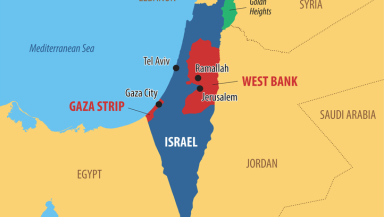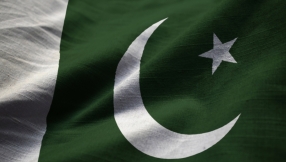
Belgium, France, Portugal, Canada, Australia and the UK have all recently recognised the state of Palestine. The case for doing so appears strong. The war in Gaza is creating some horrific conditions. If recognising Palestine as a state will help bring peace who would not argue for it?
In addition to this even before the formation of the state of Israel after the Second World War, it was agreed that there should be a two-state solution – with one state being mainly Jewish and the other mainly Palestinian. Surely now is the time to implement that to bring peace? If your worldview is created by social media, then you will almost certainly answer ‘yes’. It just seems so obvious, doesn’t it?
But Christians (and hopefully others) have a responsibility to look beyond the superficial, and the memes, and dig a bit deeper. So, let’s consider what it is we are actually talking about and whether the recognition of Palestine could result in peace, or whether it might even make things worse.
The best way I can think about things is to ask questions. I hope you will find them helpful.
1. What are the borders of this Palestine state which are being recognised?
You cannot have a state without borders. So what are these borders? In general, it is assumed that these would be the borders that existed before 1967. The only problem with this is that it would mean the displacement of more than half a million Jews and the splitting of Jerusalem.
The current population of Israel is 10.15 million people – 72% of which are Jewish, 21% Arab - which kind of gets rid of the notion that Israel wants to commit genocide against the Palestinians. The population of the new state would be 5.5 million – 3.3 million in the West bank and 2.2 million in Gaza - with no Jews.
2. Who are the government?
International governments recognise the Palestinian Authority in the West Bank, led by President Mahmoud Abbas and Prime Minister Mohammad Mustafa. Hamas has absolute control of Gaza but in general is not recognised by other nations - and therein lies a major problem.
How do you get rid of Hamas? None of the countries who have recognised Palestine will put troops on the ground. The assumption that Hamas can be sidelined through attrition rather than outright defeat, is based on wishful thinking. There is no way to remove a terrorist group who are committed to violence and have a martyrdom complex, not just for themselves but their whole people – other than by force.
3. Why has there not been a two-state solution until now?
The answer to that is remarkably simple. The Arab nations have fought hard to destroy the state of Israel from the beginning. In 1948 Egypt, Jordan, Syria, Lebanon, Iraq and Palestinian troops with support from Yemen and Saudi Arabia tried to wipe out the new tiny Jewish nation. They failed. The irony is that Israel secured 78% of Palestine, far more than the 56% they had originally been allocated. Egypt occupied Gaza and Jordan occupied the West Bank.
The second major attempt to destroy Israel was the 1967 six-day war, this time Egypt, Jordan, Syria with support from Iraq, Saudi Arabia, Libya and Algeria. Remarkably, Israel won again. They captured the West Bank (from Jordan); Gaza and Sinai (from Egypt), and the Golan Heights (from Syria).
Another attempt was made in the 1973 Yom Kippur War with Egypt, Syria and expeditionary forces from Iraq, Jordan, Morocco, Algeria, Libya, Tunisia, and Saudi Arabia. Israel again won but faced heavy losses. Despite the resultant Camp David Accord, Israel has continually faced attack from Hamas, Hezbollah and other largely Iranian-sponsored armies.
4. Would a two-state solution be acceptable to both Israel and the Palestinians?
Given the above history it is hardly surprising that the Israeli government is highly unlikely to welcome the establishment of a Palestinian state which would destroy Israel’s current borders.
Within Israel itself opinions vary. There are some extreme right-wing groups who want to remove all Palestinians from the West Bank and Gaza. There are others who somewhat strangely are even opposed to the state of Israel. All the majority want is the right to live in peace on the land of Judah, which is historically theirs. They are after all the indigenous inhabitants.
It is difficult, if not impossible to imagine any Israeli government giving up East Jerusalem, the Golan Heights or the West Bank based solely on the assurances of the West that they will be protected. Given the previous history of the West in the Holocaust, and the current increase in antisemitism in the West – and throughout the world – you can understand why the Jews want to keep their own state.
What about the Palestinians? Do they even want a two-state solution? In 2000 and 2008 they rejected a two-state solution which Israel had accepted. The reason for this is straightforward. It is summed up in the mantra which so many Western progressives chant (I hope ignorantly), “From the River to the Sea, Palestine shall be free”.
At best this means that the nation of Israel will be destroyed and all of the ex-Roman, Ottoman, Turkish, British province of Palestinia will become this new nation. At worst it means a new Holocaust, where the whole area will be purged of the Jews.
In the Hamas constitution article 7 quotes a hadith from Muhammad: "The Day of Judgement will not come about until Moslems fight the Jews (killing the Jews), when the Jew will hide behind stones and trees. The stones and trees will say O Moslems, O Abdulla, there is a Jew behind me, come and kill him. Only the Gharkad tree ... would not do that because it is one of the trees of the Jews."
Article 32 says: "The HAMAS regards itself the spearhead and the vanguard of the circle of struggle against World Zionism ... Islamic groups all over the Arab world should ... [fight] the warmongering Jews."
How can there be a two-state solution when such views exist in the leadership of the Palestinian, Arab Islamic world?
5. What does Hamas think of the recent recognition by Western countries?
There is no doubt that Hamas consider the recognition to be a major victory. They have exulted in it. For example, Ghazi Hamad, a senior Hamas official stated that "the recognition of a Palestinian state is one of the fruits of October 7”. He went on to argue that the wave of recognitions represents a "victory" for the attack, justifying its brutality as a catalyst for international pressure on Israel and progress toward Palestinian statehood. Hamas feel that they have been rewarded both for their attack on Israel and the forced martyrdom of their own people. But for them it is only the beginning. In rewarding Hamas, the Western governments have justified and encouraged Hamas in its violence.
6. Why have these Western governments done this?
They know all this. Despite the contempt in which so many politicians are held, they are not stupid. They have at least the same information as the rest of us. So why have they handed this victory to Hamas? At best it’s a kind of desperate ‘Hail Mary’ - ’What else can we do? Let’s try something’.
But I suspect it is much more cynical than that. If our primary motive is that we care about the suffering caused by war, then why are the UK, Canada, Australia and France not campaigning to end the war in Sudan? Who cares for the three million people in Afghanistan who are threatened with starvation? If we are so passionate about the genocide of a Muslim people, why are we entirely silent about the fate of the Uyghur people in China?
It is surely not without significance that all of the countries that have recognised Palestine have large Muslim immigrant populations whose religion is fundamentally opposed to the Jews. If the Jews were not involved, we would not be facing this situation.
Furthermore, they have centre left governments who are under pressure from their Left – with the Greens, the far Left, pushing for more action against Israel. Despite the incongruity and insanity of ‘Queers for Palestine’ it now appears that antisemitism in the West has a triple alliance (the old far right, the new far left, and the ever-growing Islamists). If you think that governments have not been affected by this, ask yourself why, when Italy refused to recognise Palestine, there were riots all over the country instigated by a combination of left-wing and Islamic groups?
In addition to this, Hamas are winning the propaganda war. The old Jewish blood libel has been resurrected. In a perverse twist worthy of Goebbels himself, Jews are now the Nazis wanting to kill children and commit genocide.
However, our governments should beware. Betraying Israel may work well with some of the electorate, but no nation has ever gone against the Jews and prospered. It’s not wise to touch the apple of God’s eye.
7. Will it work?
Given that the recognition is primarily for domestic political consumption, and more than a little international virtue signalling, it is highly unlikely that it will work. No hostages have been released in response and Israel will not stop its attack on Gaza – especially as it now feels increasingly isolated. In fact, isolating Israel further and rewarding Hamas is far more likely to increase the suffering of the Gazan (and Israeli) people.
My final question: what should the Church do?
I don’t have a solution to an intractable problem. I would love to see the two-state thing work, but it won’t because the hostility towards the Jews is too ingrained, and the sense of injustice against them too profound.
Gaza is mentioned several times in the Bible – because of its strategic significance. I want to mention two of them. In 1 Kings 4:24 we are told, “For he [Solomon] ruled over all the region west of the Euphrates, from Tiphsah to Gaza, over all the kings west of the Euphrates. And he had peace on all sides.” Would that not be wonderful if there were peace on all sides? We can only pray for the peace of Jerusalem and of Gaza.
And then there is this delightful detail from the book of Acts. “Now an angel of the Lord said to Philip, ‘Go south to the road—the desert road—that goes down from Jerusalem to Gaza’” (Acts 8:26). On that route Philip, the evangelist, met with the Ethiopian Eunuch who was converted. And that surely is what is needed: more evangelism. There will be no peace without Christ. Jew, Gentile, Arab, Israelis, Muslim and nominal Christians – all need Christ. May the Prince of Peace reign!
David Robertson is the former minister of St Peters Free Church in Dundee and a former Moderator of the Free Church of Scotland. He is currently the minister of Scots Kirk Presbyterian Church in Newcastle, New South Wales, and blogs at The Wee Flea.













